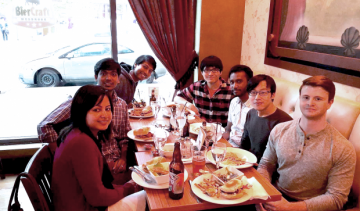
Developing 5G caching for the Canadian landscape

In the near future, we will need more bandwidth, more cell towers, and more base-stations to support the huge increase in the demand for internet services. The Cisco Visual Networking Index predicts a massive increase in wireless traffic in the next few years. Allot of this new traffic will be video; over two-thirds of the world’s mobile traffic in 2018. But wireless networks will also need to support more machine-to-machine traffic for smart technologies that will make many sustainability projects possible.
One method for easing pressure on telecommunications networks is to cache popular content close to the user, in data centers. Large providers of video content like Youtube and Netflix have agreed to provide servers in datacenters to store popular video. This reduces the distance these files travel and reduces the demand on the network.
This strategy needs to be tweaked to fit Canada’s geography. We are a big place with comparably few people. In Canada, a telecommunications company may only operate one or two datacenters. Duong Nguyen, a 2016 Vanier Scholar, is modifying content caching to work on the 10,000 or more base-stations a company operates. This would bring the content close to users even in Canada’s wide-open spaces.
In a recent paper, Edge Caching in 5G: The Big Picture, Duong and his research colleagues, Professor Long Bao Le and Professor Vijay Bhargava, discuss a holistic view of the wireless edge caching ecosystem to help unlock the potential of the technology. They argue for the importance of exploiting other features of content such as delay tolerance and ownership into future caching systems.
Duong Nguyen will be bringing his experience in developing smart power grids to the problem while he works with Professor Vijay Bhargava at UBC. Originally from Vietnam, Duong did research with the Networks and Cyber-Physical Systems Lab in Montreal modeling smart grids. He has also applied his talents to network security at the Singapore University of Technology and Design. He will be using his background in demand response in smart power grids as well as his experience in network security to tackle the challenges of content caching in telecommunications networks.
Similarities in telecommunication networks and power grids offer insights into how challenges in one system might be addressed with solutions from the other. For example, there are benefits to caching content when traffic is low similar to the benefits of moving some power consumption to the evening when power demands are low. Perhaps the most intriguing problem will be developing the strange calculus to predict exactly what content will be popular in each of the regions served by base-stations. Duong is not daunted, only fascinated by the challenges of a decentralized network.
The Government of Canada launched the Vanier Canada Graduate Scholarships program in 2008 to strengthen Canada’s ability to attract world-class doctoral students and establish Canada as a global centre of excellence in research and higher learning. Vanier Scholarships support students who demonstrate both leadership skills and a high standard of scholarly achievement in graduate studies in the social sciences and/or humanities, natural sciences and/or engineering and health.
Photo: Doung Nguyen (back right) at dinner with research colleagues
